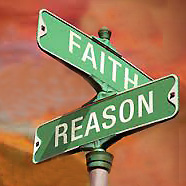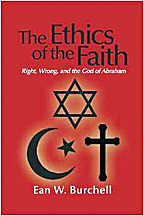
by Jack L. Kennedy
Author Ean W. Burchell knows what book he distrusts the most: the Holy Bible...anyones view or translation of it.
The onetime educator/skeptic has compiled his bitterness and mistrust in a volume called The Ethics of the Faith: Right, Wrong and the God of Abraham. Irony abounds, as his views are so stridently stated with no other views to support his, that the book could provoke a lively discussion in almost anyones Sunday School or adult class. One also can hope that those discussions will bring in more points of view and greater substantiation. The authors monologue, self-professed to be "critical thinking," turns into something Burchell himself says he is against: unproven statements, often inconsistent, used in print to make a not always ethical point.
Examining the ethics, or the right to set a moral compass, by the god the Hebrews called Yahweh, Burchell bitterly and relentlessly picks apart the Old Testament. In too many cases, the author believes, Yahweh overlooked sexism, poor judgment and common sense, to condone the actions of Moses, Isaac, Abraham, Cain, Abel and other biblical figures.
The Canadian educator has traveled geographically from his homeland, throughout the U.S., to Saudi Arabia and Thailand, among other nations. But some readers will say he has traveled little intellectually. His views of the scriptures at close range appear to be shallow, sour and lacking in substantiation. He might back up his tart tasting of the ethics of the worlds great religions, for example, by comparing various translations, or different theologians points of view. Instead, a nearly 300-page sermon of purely his own making is made out to be scholarship and not sarcasm or sophomoric mutterings.
In his afterword, Burchell claims that the book is not an atheist or anti-atheist tract, but his way of examining the foundational writings of religion. He says the purpose is not to question whether what all the religions profess is true, but whether any of the tracts can be used to help form moral guidance. He quotes Voltaire as saying, those who make you believe absurdities can make you commit atrocities.
This one time junior and senior high school teacher in the Roman Catholic Diocese of New York might make a good outdoorsman, but perhaps cannot see the forest for the trees. His dogmatic writing is ironically what he accuses religions foundational words of being too often: not detailed or direct or specific enough, with holes that must be filled in by imagination or intellect. Moses, Solomon and others are often pilloried by the author for not offering all of the details or providing sufficient direction behind their dictates or diatribes.
The most common Burchell rhetorical failing, some readers and theologians or educators might say, is that he appears to be trapped in a very literal world. The semantic science of metaphor, fantasy, mental picture and words with many meanings seems to have passed the author by. He apparently expects religious writings and feelings to be very photographically profound, spelled out word for word and firm. Sorry, Mr. B., to many the world is not like that, or would be very dull if it were.

Title: The Ethics of the Faith: Right, Wrong and the God of Abraham.
Author: Ean W. Burchell
Paperback: 284 pages/$15.75
Kindle: 475 KB/$9.99 or free for Amazon prime holders
Publisher: CreateSpace Independent Publishing Platform (6/20/13-8/8/13)
Language: English
ISBN-10: 148273849X
ISBN-13: 978-1482738490
ASIN: B00EEQDFN0






Comments